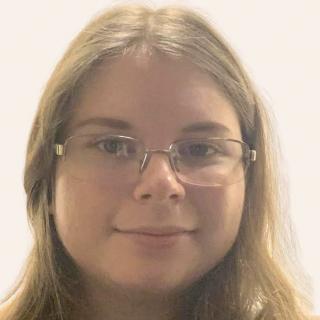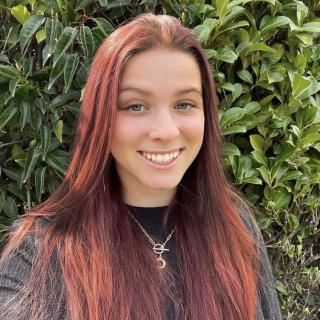Technical Staff

Allie graduated from the University of Georgia with a BS in Microbiology and a BA in Music, where she studied protein-lipid droplet localization behaviors in yeast models in the Starai Lab. She has previously interned in the Foster Lab to examine the effects of simulated microgravity on animal-bacteria symbioses in order to understand how spaceflight alters host-microbe interactions. Currently, she is working in the Averesch Lab to research bioplastic production through microbial engineering. She hopes to pursue a PhD to explore solutions to existing challenges in space biology, biotechnology, and environmental sustainability. In her free time, she enjoys playing piano, learning traditional Chinese instruments, and crocheting.
Postdoctoral Scholar

Sulogna Chatterjee is a Postdoctoral Fellow in Criddle-group at Stanford University where she is working on Metabolic Engineering of autotrophic microorganism for better carbon efficiency and production of high-performance bioplastics.
Dr. Sulogna is a DST Inspire Fellow, holds a PhD degree in "Environmental Biotechnology & Microbiology" from "CSIR- Indian Institute of Chemical Technology", India. Her research interest is carbon conversion, waste valorization, bioprocess designing, bioreactor operations, fermentation technologies, bioenergy production and circular biorefinery systems.
During her PhD she has published several high impact research papers and has been awarded the “Research Excellence Award” by BRSI-India and "Best Research Fellow Award" by CSIR-India. She has also represented 'India' in C3E- Women in Clean Energy Education Empowerment Symposium organized by U.S Department of Energy, MIT Energy Initiative, Stanford Energy and Texas A&M University, 2019.
Graduate Student

Born and raised in Salt Lake City, Utah. Obtained my bachelor’s in graphic design from the University of Utah where I also commissioned into the US Air Force. Received my master’s in Human Services: Health and Wellness from Liberty University. I am leaving active duty for a couple of years to finish my master’s in microbiology and gain experience in the field.

Angela received a B.S. in Aerospace Engineering from the University of Florida in 2021. She is currently a graduate student in the Department of Mechanical and Aerospace Engineering at the University of Florida where she works with Dr. Amor Menezes. Her work in CUBES is in the area of food and pharmaceutical synthesis and includes modeling of plant-based production of biologics in space as well as AI-based control of environmental conditions to maximize food production.
Undergraduate Student

Isaac Lipsky is a senior undergraduate student at UC Berkeley studying environmental science. In concert with Aaron Berliner, he is working on developing cost-benefit metrics for Mars surface operations. His interests include planetary science and the tantalizing prospect of Martian terraforming.
Alumni

Sophia is a sophomore at UC Berkeley studying Molecular & Cellular Biology and Economics. She was initially drawn to CUBES because of their work with In-situ Resource Utilization and is interested in studying different forms of life in strenuous environments. In her free time she enjoys surfing, playing soccer and reading novels.

Cameran Casale is a second year undergraduate student at UC Berkeley studying bioengineering. She is currently working with Aaron Berliner in the Systems Design and Integration Division of CUBES. In her time at this lab, Cameran is interested in exploring different biological applications within space systems, such as the utilization of biologically derived materials in the development of nanoscale devices. When she's not in the lab or studying for school, Cameran is usually out playing beach volleyball or bass guitar.

Skyler Chan is studying Electrical Engineering and Computer Science at UC Berkeley, and he has wanted to become an astronaut since he was 3. In high school, he learned how to fly gliders, and was involved in various student-led space organizations. One of his goals is to make humanity an interplanetary species within our lifetime, and he joined CUBES to advance this mission. Currently, he builds in the Systems Design and Integration Division of CUBES. He is interested in exploring sustainable design on Mars, such as, how to build the first self-sufficient Martian cities. To Skyler, the idea that the choices we make designing the first Martian habitats today will have an impact on the future of humanity never gets old. In his free time, he can be found flying drones, PR-ing at the gym, and filming videos with friends.
Zain earned a BA in Planetary Science from UC Berkeley. He developed an interest in spaceflight at a young age watching launches at Cape Canaveral. Even as a child he was interested in sustaining human life in space. He hopes to live to see the day when humanity has a permanent Mars colony. On top of his interest in space, Zain has an interest in medicine and hopes to eventually be a physician-scientist. He discovered his interest in medicine after taking biochemistry classes, where he became fascinated by the interconnected chemistry of the human body. In the future, Zain plans to attend medical school and apply in depth knowledge of human biology to space colonization efforts. He joined CUBES just after graduating from UC Berkeley in May 2022. At CUBES, he helps define states for bioastronautics software under Aaron Berliner. In his free time, Zain likes to make music on his guitar and piano, hike, and volunteer with the American Lung Cancer Screening Initiative.

Jithran Ekanayake grew up in Sri Lanka and moved to the United States in 2016 to study biology at Carleton College, MN on a Starr Foundation scholarship. He is now a graduate student in the Department of Agricultural and Biological Engineering at the University of Florida, where he works with Dr. Amor Menezes and the Systems Design and Integration Division of CUBES to develop experimentally-validated models of space biomanufacturing processes in low-shear modeled microgravity.
Outside of space synthetic biology, he is interested in pararescue, resilience education, and how space exploration could function as a propellant for the peaceful unification of people and nations across the globe.

Skyler Friedline received his BS in Biochemistry and Molecular Biology from UC Santa Barbara in 2016. He is new to the fields of synthetic biology and microbial engineering but is motivated to learn quickly and make an impact. He began working as a research associate and lab manager in Adam Arkin's UC Berkeley Lab in 2019. He is interested in the development of microbes enabling closed loop living in space and on earth.

Soumyajit Sen Gupta has been a member of the SDID division of the CUBES since March 2018. Prior to joining the CUBES as a post doctoral research associate with Dr. Amor Menezes, he was a doctoral research scholar at Indian Institute of Technology, Bombay since 2012. His doctoral thesis was on integrated plant-wide optimization of microalgae biorefinery, co-producing fuel, food and chemicals. He is a Bachelors' (2010 batch) from Jadavpur University and Masters' (2012 batch) from Indian Institute of Technology, Kharagpur; both these degrees have been in the discipline of Chemical Engineering. His research interests are in the area of systems design, modeling and optimization, renewable energy and process systems engineering.
Farrah is a second year undergraduate student studying Bioengineering and Electrical Engineering and Computer Science. In the past, she did computational biology research at UCSD working on genome-scale metabolic modeling. She joined CUBES in late Fall of 2021 working under Aaron Berliner. Currently, Farrah is working with Davian to create a crew-member model that simulates how crew members consume and waste resources during space travel and extravehicular activity.

Jorge is originally from Chicago where he attended Loyola University Chicago and received his B.S. in Environmental Science with a Chemistry Minor. After his undergraduate studies, he attended Stanford where he obtained his M.S. in Environmental Engineering and where he has continued as a PhD student working with Professor Craig Criddle. His research focuses on biotechnology with an emphasis on efficiently utilizing waste streams to produce biological materials (e.g., bioplastics, biofuels). As part of the CUBES effort, Jorge's research involves identifying organisms that can thrive on the limited amount of resources available for long-range space travel.

Mia Mirkovic is a second-year undergraduate student in the Electrical Engineering and Computer Sciences department at the University of California, Berkeley pursuing mixed-signal processing and circuit design. Her interests include systems modeling and control, imaging, representation theory, modern music technology and history, and radio.
She works with Aaron Berliner on the development of Crucible, an open-source, 3D-printable chamber for space synthetic biology experiments, and mathematical models for Martian in-situ resource utilization for life support, power, and an integrated, multi-function, multi-organism bio-manufacturing system to produce fuel, food, and materials. These models will likely underlie a software package for accelerating mission design and simulation.
Dr. Takashi Nakamura received his Ph.D. in Aeronautics and Astronautics from MIT and his B.S. in Aeronautical Engineering from the University of Tokyo. Currently, he is the manager of Space Exploration Technologies at Physical Sciences Inc. (PSI), and has been involved in numerous R&D programs sponsored by NSF, NASA, DoE and DoD.
Dr. Nakamura has been developing, with funding from the Air Force and NASA, a unique space solar power system for power generation, propulsion, materials processing, and plant lighting in space. This concept is based on the use of optical fibers for transmission of solar radiation, the concept Dr. Nakamura pioneered in 1976 while he was at Japan's Electrotechnical Laboratory. Dr. Nakamura is an Associate Fellow of AIAA, a member of AAS and Sigma Xi.

Tiago is a visiting doctoral student from the Humans on Mars project of the University of Bremen, Germany. As a part of his doctorate project, he is looking to convert cyanobacterial biomass produced on Mars from in-situ resources into a plant fertilizer and other products of interest. To carry out this conversion both anaerobic digestion and bioelectrochemical systems are employed and explored within a wet lab and modelling context. The overarching goal is to explore Mars sustainably by harnessing local resources and reducing shipped payload mass. During his research stay, he will be working on the bioplastic production by C. necator and the modelling of the cyanobacterial biomass processing.
Alex Starr is a second year undergraduate at University of California Berkeley with interests in synthetic and molecular biology, applied math, artificial intelligence, and the utilization of biology in space exploration. As part of CUBES, he is working to develop a system for the detoxification and enrichment of Martian regolith using the perchlorate reducing bacterium Azospira suillum PS. Prior to joining CUBES, Alex studied expression of genes related to root growth in sunflowers and worked on understanding the genetic basis of drought-tolerant root phenotypes in maize.
Dr. Trenton (Trent) Smith is an Associate Professor of Biology at Simpson University in Redding, California. He received his Ph.D. in the lab of Dr. Vicki Vance at the University of South Carolina in 2001, studying viral suppression of RNA interference in plants. Specifically, he generated and studied suppression of RNAi in transgenic Arabidopsis thaliana expressing the helper component proteinase from Turnip Mosaic Virus. In early 2018, Dr. Smith joined with the lab of Dr. Karen McDonald and Dr. Somen Nandi at UC Davis, as a visiting scientist. He is designing systems to express cell wall-degrading enzymes in potato, as part of the biofuels work of CUBES.

Gretchen Vengerova is a third year undergraduate student at UC Berkeley, studying bioengineering. She is interested in applying bioengineering concepts to conservation efforts. Previously she worked at CSU San Marcos, studying the transcriptomics of algae. In CUBES, she is working to study potential loop closure processes in a Martian biomanufactory. In the future, she hopes to use loop closures concepts to decrease terrestrial waste and pollution, but she would also enjoy more opportunities to merge bioengineering with space.